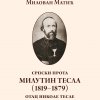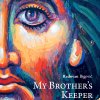Најзад прва књига о Милутину Тесли (Радуч, 1819 – Госпић, 1879), која доноси нова сазнања о пресудним утицајима оца Милутина на васпитање и образовање сина Николе.
Након дугогодишњих истраживања, аутор приказује целовиту биографију и све до сада пронађене радове, преписку и записе проте Милутина Тесле, српског националног радника, трибуна, проповедника, полиглоте, песника, просветитеља, оца генијалног Николе Тесле.
Милутин Тесла је дуго у неправедном и неоправданом забораву, иако то можда звучи парадоксално с обзиром да се његово име помиње у свим биографским записима о његовом сину Николи. Сем неких спорадичних страница на интернету, последњи озбиљнији текст о њему објављен је пре више од осамдесет година (1928), а академик Василије Крестић је нешто више осветлио његов боравак у Смиљану на основу новооткривених и драгоцених писама у својим радовима 2006. и 2009. године.
Књига има два дела. У првом делу обрађује порекло породице и презимена Тесла, биографије Милутиновог оца Николе и мајке Ане, супруге Ђуке, брата Јосифа, другог сина Данила и три ћерке: Милке, Ангелине и Марице, као и сва четири ујака Мандића.
Свестрано је истражен животопис Милутина Тесле у свим његовим аспектима: школовање, брак, сва места службовања – Штикада, Сењ, Смиљан и Госпић, рођење, одгајање и однос са сином Николом. Посебан осврт је усмерен на лик проте Милутина као врсног проповедника, дописника, стихотворца, књигољупца и узорног православног свештеника који је неговао добре односе са римокатолицима и муслиманима. Други део књиге доноси прилоге у оригиналном облику: дописе, записе, преписку, сведочења савременика, као и накнадна истраживања.





